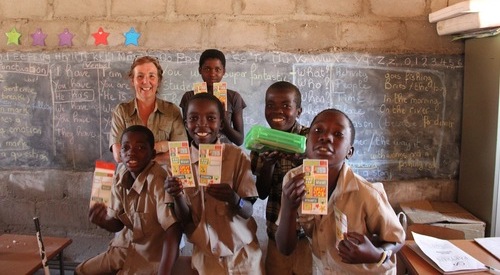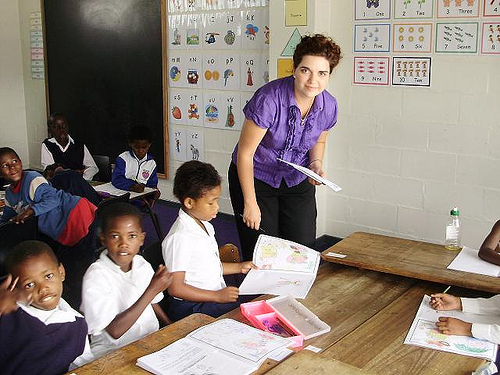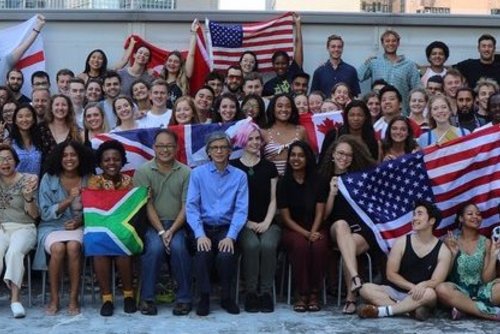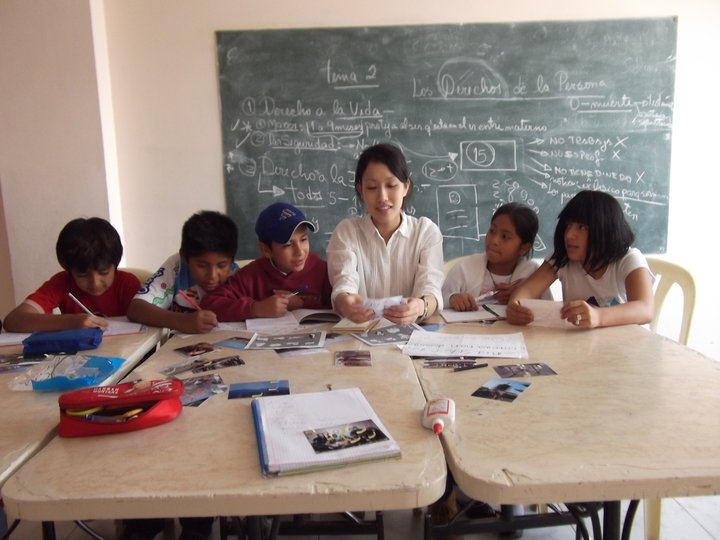A Guide to Teaching Abroad in Africa
Are you considering teaching abroad? Africa is a fantastic continent and you have the choice of over 50 countries when it comes to choosing a destination. In most places you will not need a TEFL certification, just a desire to want to help and demonstrate you are enthusiastic about applying. You will need to research all teaching roles, it might seem appealing to apply but you should consider that these types of placements can be hard work in difficult conditions with overcrowded classrooms and poor facilities.
Where you go really depends on personal choice, every country is different. Teaching in Africa can also be a LOT of fun, and provide you with the most amazing experience you might ever have. Students are very keen to learn and will want to know everything about your and your home country. There is a lot more to these roles than just working in a classroom too, you will usually get to help out with sports coaching, art, music, IT and community events.
“Education is the most powerful weapon which you can use to change the world”. - Nelson Mandela
Browse Placements By Destination
- Benin
- Botswana
- Bukina Faso
- Cameroon
- Cape Verde
- Cote D'Ivoire
- Egypt
- Ethiopia
- Gambia
- Ghana
- Kenya
- Liberia
- Madagascar
- Malawi
- Mali
- Mauritania
- Mauritius
- Morocco
- Mozambique
- Namibia
- Nigeria
- Rwanda
- Senegal
- Seychelles
- Sierra Leone
- South Africa
- Swaziland
- Tanzania
- Togo
- Uganda
- Zambia
- Zanzibar
- Zimbabwe
Why the Need for Assistance
Youth make up to fifty percent of the population in some areas of Africa, and there are simply not enough resources available to provide every child with an education. Furthermore, in some countries, school only recently became a reality. Therefore, literally thousands of students are pouring into classrooms to learn all that they can. With an Education focus, you will increase the capacity of a school or community-based organization to provide education to children and youth.
More specifically you will be teaching English as a second language, or teaching various subjects in elementary or secondary school. An education placement is an exceptional learning opportunity for someone pursuing education as a career. You will be able to compare education across cultures. Furthermore, from your lived-in experience, you will gain an invaluable understanding of the way social and economic factors shape education today.
TEFL Courses in Africa
TEFL Courses in AfricaIf you are adventurous and looking for a fresh exciting experience you might like to search and book a TEFL course in Africa through our website.
Places you can study include exotic Alexandria in Egypt whilst South Africa is also an appealing place to learn. Most courses are available to join every month throughout the year and you will learn the basics skills and techniques needed to teach English. Classroom courses are a great way to integrate into the local culture, meet other participants and get face-to-face help from experienced tutors.
Popular Places to Earn a TEFL Certification in Africa
- Egypt
- Morocco
- South Africa
Help / Advice
If you need any help arranging a TEFL course in Africa please get in touch.
Africa TEFL Course Reviews
If you have ever taken a TEFL course in Africa and would like to add a review, write about your experience or share any recommendations please contact us,
TEFL Jobs in Africa
With globalization, English has been spreading its reach further throughout the world. For many children, while it is imperative to maintain their own culture and language, learning English increases their future employment opportunities. This is particularly true in areas receiving English speaking tourists. On a placement focused on English as a Second Language. There are several ways in which you can contribute. Firstly, you may teach English to children, youth, or adults. Secondly, you can provide extracurricular programming in English. Or thirdly, you will spend time speaking with students, which is one of the best ways for them to practice their new language skills.
Teach in Elementary & Secondary Schools
There are not enough teachers to teach all of the children in the schools in Africa. For example, one kindergarten class of seventy-five children could have just two teachers! International TEFL teachers are urgently needed to assist teachers in the classrooms. You will be instructing children, and tutoring children one-on-one. You will be provided with a curriculum to teach, and also be able to bring in your own expertise. For example, a fine arts student might teach the children to create art using local materials. Local teachers will be incredibly grateful for the time you can give; it enables them to better provide an education for the students.
Teach at Community Development Initiatives
With a focus on community development, your placement will be concentrated on efforts to increase the capacity of the host organization you are working with. Many of our partners persevere to advance education, provide healthcare, and deliver social services in their communities. However, they often lack the resources. Often times they simply do not have access to finances or technology. In other cases, further training might be needed.
With a community development focus, there is a wide variety of projects you can put your time and energy towards. The most common activities in community development are grant writing and donor development, program development, and publications. All community development Activities are done in consultation with your host organization, and you will receive first-rate guidance from local staff.
Duration
Most companies usually require a long term commitment but shorter opportunities are available. We recommended booking for at least 4 weeks so you get to know local staff, students and also give yourself the best chance to make an impact.
Paid Teaching Jobs in Africa
If you are just looking to boost your pay packet then teaching in Africa is probably not the best idea, a lot of teaching jobs are unpaid compared to teaching in Asia and other places. This is as much about the experience than the pay packet. Although it is possible to find a paid teaching job in Africa but it just requires a lot of research and also experience.
Qualifications
To give yourself the best chance to get a paid TEFL job in Africa you usually need a TEFL certification, a degree and also be a native English speaker. For more general and voluntary positions you will not usually need any formal qualifications as full training will be provided.
What to Expect
Teaching in Africa can be challenging and difficult at times, this continent is developing and so don't expect conditions and facilities to be like other worldwide destinations. Most international teachers really enjoy the experience as this is a chance to make a difference.
Teaching in West Africa
Calling all teachers and artists! Would you like to share your creativity with young minds in West Africa? Local organisations, including, the International Centre for Arts & Music in Ouidah (CIAMO) which is a vibrant center devoted to promoting arts education as a dynamic tool for growth in the developing world. Every week over 300 students pass through the doors, taking advantage of opportunities to thrive and grow in the arts. CIAMO also works with local area artists, helping them to gain expertise that permits them to become better artists and better teachers. CIAMO relies on a team of international and local artists to teach its students. We need your help!
Your role as a visual arts teacher will collaborate with the visual arts program manager to teach color, design, paint, and sculpture to primary and secondary students. Examples of activities including teaching basic classroom art to large classes with the assistance of primary school teachers (30-60 students), teaching small classes in the volunteers speciality (ex. watercolor, muraling, sculpture) and working with local visual artists to reinforce their skills as both artists and teachers. I
In West Africa you will need to learn basic French (Note: if you do not have the required level of French, contact us to learn about options for language learning before your placement or other opportunities which may be suited to your goals and skills). Teachers should consider teaching at CIAMO as a full-time activity. You will spend 5-10 hours a week teaching primary school students, and another 10-20 hours a week teaching smaller classes, working with artists, and helping students to excel.
What to Do in Your Spare Time
This continent is beautiful and diverse, if you would like to make the most of the experience you might like to search our Africa tours. We also have a selection of volunteering programs in Africa which are very rewarding whilst spending a gap year in Africa is increasingly popular.
Africa TEFL Reviews
Are you or have you ever been to teach in Africa? Would you like to share your experience? Contact us today.
"It is with our doubt the most interesting, exciting and most amazing three months of my life. I left Africa knowing that I want to do teaching as a career, and if I'm getting the opportunity, I will go abroad and teach again! Go teach in Africa, it will change your way of looking at life!" - Amalie, Norway
"I'm a teacher from Ireland teaching in Africa. School starts each day at 8am until about 4pm and a variety of classes are taught in English including English, maths, science, life skills, and creative art and sports. Internationals are able to get involved in teaching any of these classes, either alongside a local teacher or sometimes independently. Schools are quite short staffed so teachers are always welcome to apply. Staff also like us to teach children one to one, especially in the afternoons, as this really helps those who are struggling to keep up. There are standard textbooks throughout Kenya from level 1 to 8 and they work through each level each year until they finish primary school after 8, they then hope to go to High School and this is more possible if they achieve good grades at kevel 8 exams, as they may then be able to get a scholarship.The local teachers are extremely friendly and appreciative of any help. The senior teachers are responsible for the the international teachers and will agree a schedule with them during their first few days. The school I teach at has about 10 or 11 classrooms, a very limited computer room and library (although they rarely have electricity due to a deficit owed on their bill), a kitchen, staff room and a couple of offices. Our group also help clean and paint some of the more run down classrooms which is optional although beneficial." - Mat, Ireland
"Being welcomed into a local rural community is a privilege. The children took the teaching really well, as did everyone else who we taught in the rural towns. African education is characterised by a very strict education regime; education is highly valued in the hope that one day the continent can evolve and become a nation rich in good health, good opportunities and with governments which listen to the people. However, even in strict schools, teachers know the value of first aid and good education, so they welcome internationals to teach lessons. By making a good first impression, this allows you to develop a positive working relationship with children and the schools, which meant that you would be asked to come back and teach. The children took the teaching really well, as did everyone else who we taught in the rural towns." - Janine, UK








